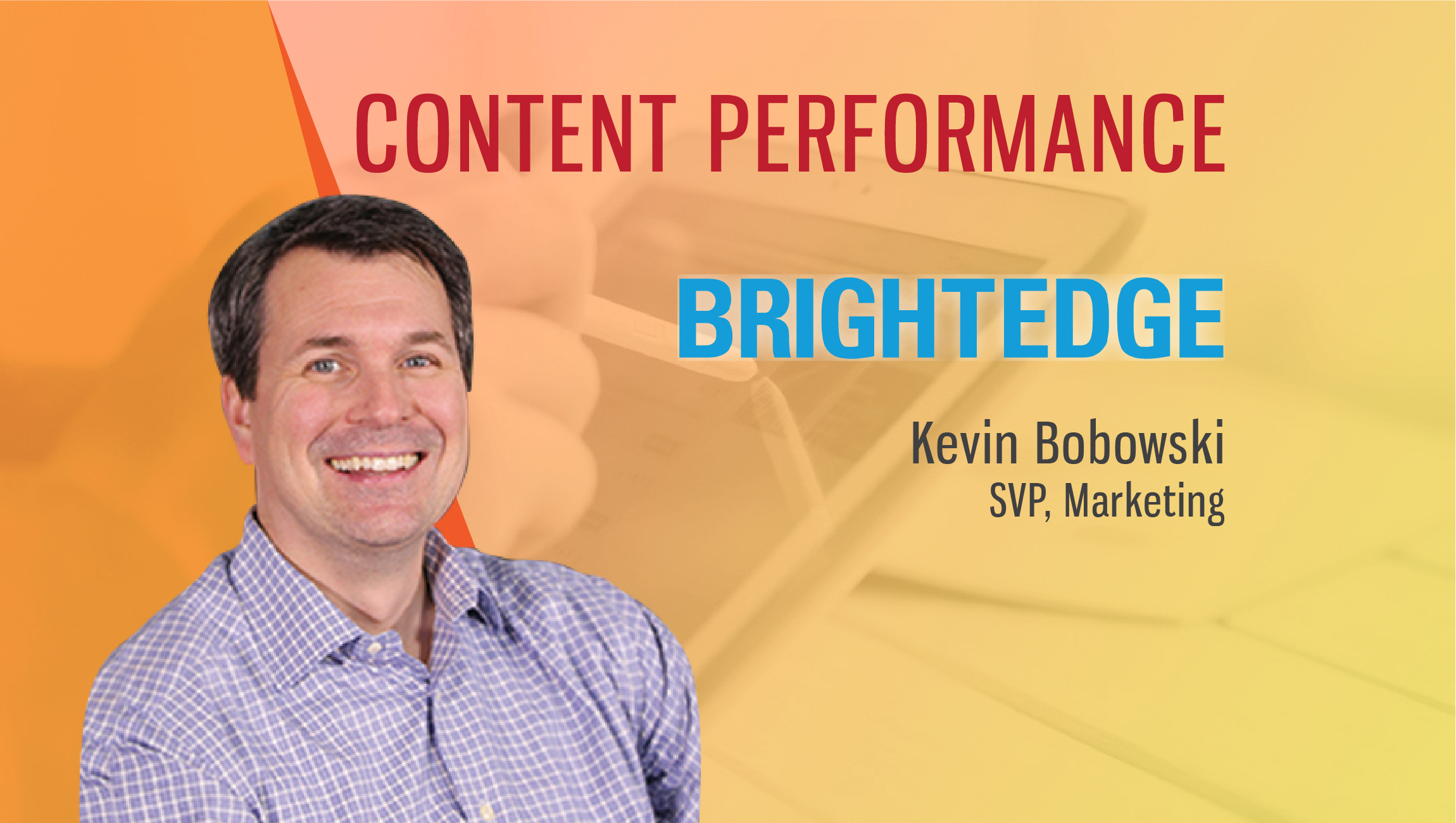Kevin Bobowski
SVP Marketing, BrightEdge
Personalization technologies and data allow us to segment customers into more targeted groups. AI helps marketers gain a better understanding of the customer and increases productivity. These are some of the main findings of Brightedge’s 2018 Future of Marketing and AI Survey. To learn more about how marketers could leverage personalization, We spoke to Kevin Bobowski, SVP Marketing, Brightedge.
Html code here! Replace this with any non empty text and that's it.
What is the State of Customer Experience in 2018?
In 2018, customer experience is emerging as one of the single, most important areas of differentiation for brands everywhere. Changes in consumer behavior, consumer expectation and competition have accelerated. Brands are no longer able to compete on price. Instead, brands must compete on delivering a compelling customer experience. Marketing departments are in the best position to lead customer experience initiatives. A key to delivering a great customer experiences starts with understanding the customer – and that requires data to understand consumer intent and market demand across the customer journey. Marketers have a unique ability to leverage this data to create highly integrated campaigns and intelligent experiences.
Starbucks figured this out more than 15 years ago and it has been part of their engine of growth. You can also see this in the examples of Amazon bookstores and Amazon grocery stores. They are invigorating mature retail categories with a smart and engaging shopping experience.
How is personalization different from the contemporary definition of Customer Experience? Do you see both meeting/converging at some point?
Customer experience is the broadest view of how we serve customers and prospects. Personalization drives a great customer experience. It is difficult to deliver a great customer experience without some form of personalization, which increases relevance and decreases generic product and messaging clutter. Personalization technologies and data allow us to segment customers into more targeted groups and provide them more accurate information and assistance. Relevance increases engagement and satisfaction. Google, Netflix, and Amazon, have all made huge investments in personalization and that helps solidify their leading positions in the market.
How should marketers develop AI-powered content marketing strategies?
Building an AI-powered content marketing strategy is a journey. Simply adding AI to the title of your product or adding AI to your company description is NOT an AI strategy. A successful AI-powered initiative begins with data. Without valuable data and a platform that easily organizes data from different sources, AI and the algorithms behind it are not very valuable. Also, marketers must start with a very specific problem to solve. We call that the “Application of AI.” While AI is invaluable for processing large and complex data sets, generating more insights and recommendations might actually add to the problem that marketers are trying to solve. Insights and recommendations must be relentlessly prioritized – and focused on the handful of recommendations that have a material impact on your business.
Marketers should take the simple step of exploring vendors who have access to massive data sets, have natively integrated AI into their platform, and have AI woven into the daily workflow of a marketer. This is the best and fastest way for marketers to learn about AI and become AI-First Marketers.
In content marketing specifically, marketers can use AI to find patterns around consumer intent, inspiring moments that open up huge opportunities if properly captured. When marketers reach customers and prospects early in the customer journey, there is often less competition and a higher likelihood that they can deliver a compelling customer experience with inspirational content.
AI will also help with content sequencing, a complex problem that marketers face today. For example, if you have three personas and many stages across the customer journey, with six content pieces that they might consume in various different orders, you end up with over 2000 possible combinations and just a handful of them would be optimal performers. That complexity requires a lot of data and machine learning to identify the right intent modelling.
What are the challenges to becoming a decision-driven marketer in 2018?
Too much data, too many actionable insights and not enough time. Sometimes too much of a good thing (data and insights) is bad. Marketers need to identify the small number of insights that will have the biggest impact on their business.
Why is Voice Search suddenly a pet technology for marketers? How could AI and Voice Search deliver better Customer Personalization?
Voice Search has moved from pet project to a key pillar for delivering a personalized customer experience. Brands must be discoverable everywhere consumers are – and voice search is no different. Voice search needs to be an integral piece of the overall marketing strategy. Optimizing for voice search is part of what my company BrightEdge calls smart content, content that blends the best of search marketing, artificial intelligence, and content marketing to power the development, activation, and optimization of high-performing content.
Comscore predicts 50% of searches will be verbal by 2020. Voice search and machine verbal response enable a scalable way for companies to “converse” with more consumers without the headcount investment. Smart digital assistants will adapt to accents and over time should learn the preferences and favorites of consumers. Some of the futuristic shows and product characters of the past, like Knight Rider, seem not too far off in the future.
While marketers need to be prepared for this future, in all honesty, the ones who are going to “take all” are the ones who are already winning at Voice Search right now, as we’re already seeing it become essential to the customer experience.
How would SEO strategies change with the greater maturity of AI/ML for content?
We continue to see SEO and Content Marketing converging into a single function, which is needed to deliver intelligent experiences for consumers. AI is accelerating this convergence. With organic search, marketers gain the market insights to identify the best content to deliver intelligent experiences and results. And it enables brands to be more visible for the increasingly complex SERP environment. For example, we see more than 40 SERP layouts at Google, many of which reward content that is best aligned with consumer intent.
What are your predictions for content marketing strategies based on intent and persuasion? How would your latest report help marketers optimize their content marketing?
In this year’s Future of Marketing and AI survey, nearly 75 percent of all marketers responded that three trends are dominating across all marketers – whether B2B or B2C. Additionally, each of the top three themes require and use Artificial Intelligence today. According to marketers, the next big technology in 2018 is as follows:
- Personalization – 29 percent of respondents
- Artificial Intelligence – 26 percent of respondents
- Voice Search – 22 percent of respondents
Some Predictions for AI and Marketing
- For every brand, customer experience is the last, sustainable source of competitive advantage.
- Marketers with deep knowledge of market trends and consumer intent will differentiate themselves from the competition.
- AI will only accelerate the convergence of SEO and Content Marketing to drive intelligent experiences that consumers love.
The BrightEdge 2018 Future of Marketing and AI Survey Report describes marketers’ awareness of the opportunity to use AI to deliver the right content to the right people at the right moment that moves them along the customer journey.
Thanks for chatting with us, Kevin.
Stay tuned for more insights on marketing technologies. To participate in our Tech Bytes program, email us at news@martechseries-67ee47.ingress-bonde.easywp.com











